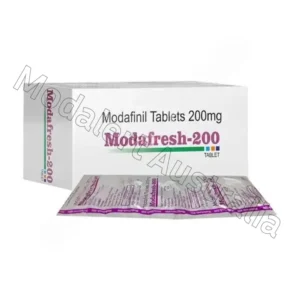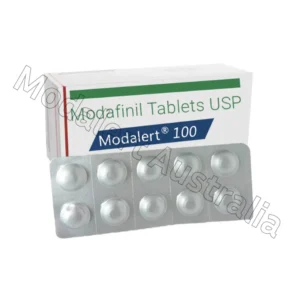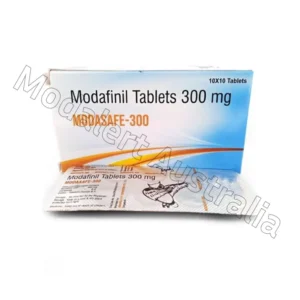What Does Modafinil Do to Your Brain?

Introduction: The Mysterious Power of Modafinil
What does modafinil do to your brain? Modafinil is a medicine that helps people stay awake. It was initially developed to treat sleep disorders, such as Narcolepsy. However, nowadays, many people, including medical professionals, students, and shift employees, use it to remain alert during extended periods. It is sometimes referred to as a “smart drug” because it is believed to help sharpen concentration. But what happens to your brain when you consume this drug? Do you stay awake or alter your thinking?
Modafinil is an extensively used stimulant for the brain that has been praised for its capacity to increase the state of mind, focus, and productivity. It was initially developed to treat sleep disorders, such as Narcolepsy and shift work disorder, and has since gained a lot of recognition among professionals, students, as well as biohackers looking to improve their cognitive performance.
This article will explain precisely what modafinil does to your brain. It will discuss the research, its effects, and dangers. At the end of this, you can determine whether it’s worthwhile to try or be cautious.
Modafinil’s Primary Mechanism: More than Just a Wakefulness Drug
Modafinil’s precise mechanism isn’t known. However, research suggests it operates via multiple neurotransmitter systems instead of simply one. Contrary to traditional stimulants (e.g., amphetamines), Modafinil doesn’t cause a huge dopamine boost that reduces the danger of dependency and extreme crashes. Many stimulants, including caffeine and Adderall, can force your brain to go into hyperdrive. They flood your brain with dopamine, which could cause a crash later. Modafinil differs from other drugs.
Instead of overburdening your system, this program tweaks specific chemical compounds:
- Dopamine – Modafinil blocks dopamine’s ability to be rapidly absorbed. The dopamine levels remain steady, which improves concentration without the excessive euphoria and addiction threat of more potent stimulants.
- Norepinephrine – The chemical is responsible for alertness. Modafinil enhances its effects and makes you feel more alert.
- Histamine – Most often linked to allergies, histamine helps keep the brain on. Modafinil increases the amount of histamine that is produced in the hypothalamus. It fights sleepiness.
- Orexin – The neurons control wakefulness. The majority of people suffering from Narcolepsy lack orexin. This is the reason Modafinil can help them stay awake.
- Glutamate & GABA Balance – Modafinil improves the excitatory glutamate output and slightly reduces GABA (an inhibiting neurotransmitter), improving cognitive clarity.
As it doesn’t cause dopamine surges as amphetamines do, Modafinil isn’t able to trigger similar withdrawal symptoms.
The Brain on Modafinil: Enhanced Cognition or Just Alertness?
Many people believe that Modafinil can make people smarter. Other people say it prevents their bodies from becoming fatigued. What do the studies say?
Memory & Learning
Research shows mixed results. Certain people are better at recalling information when they take Modafinil. This is especially true for those who are sleep-deprived. If you’re well-rested, this effect will be less noticeable.
Focus & Task Switching
Modafinil’s greatest strength is its continuous concentration. Monotonous, tedious tasks are made more simple. For creative thinking, certain users feel restricted and unable to think of new concepts.
Decision-Making & Impulse Control
The prefrontal cortex is more effective with Modafinil. The people make fewer reckless decisions and follow through with schedules more readily. That’s why people living with ADHD take it without a label.
It’s certainly not a miracle drug. Modafinil will keep you awake if you’re tired, but it doesn’t completely restore your brain’s peak performance.
Neurochemical Effects of Modafinil
Dopamine Modulation
Dopamine plays a crucial role in satisfaction, motivation, and focus. Modafinil blocks the dopamine transporter (DAT), increasing the dopamine available within synapses. It does so in a more subtle manner than amphetamines. This reduces the potential for abuse.
Effects:
✔Improved focus and work persistence
✔ Reduced procrastination
✔A mild feeling of euphoria (in the case of some users)
Norepinephrine Boost
Norepinephrine (noradrenaline) is connected to alertness and the stress response. Modafinil raises levels of norepinephrine, increasing alertness and reaction speed.
Effects:
✔ Improved vigilance
✔Greater resilience to stress
✔ Faster decision-making
Histamine Activation
Histamine is a wakefulness-promoting neurotransmitter. Modafinil enhances histamine production within the hypothalamus and keeps people awake without the excessive stimulation that is associated with caffeine.
Effects:
✔ Reduced sleepiness
✔Continuous energy (without crash)
Orexin Stimulation
Orexin (hypocretin) neurons regulate sleep and wake cycles. Modafinil stimulates these neuronal networks, making it very effective for sleep disorders and shift workers.
Effects:
✔Helps prevent sudden sleep attacks
✔ Stabilizes circadian rhythm
Modafinil’s Impact on Different Brain Regions
Prefrontal Cortex
This part is responsible for control and planning. Modafinil enhances the activity of this region and assists with more difficult tasks. However, too much of it can make your thinking difficult.
Basal Ganglia & Dopamine System
Connected to motivation and habit-forming. Modafinil’s effects on dopamine make tedious tasks feel more enjoyable. This is the reason why many people who procrastinate benefit from it.
Hypothalamus & Orexin Neurons
The hypothalamus is the brain that regulates the sleep cycle. Through activation of orexin, Modafinil blocks the sleep signal. This can be great for pulling late-night sleepers, but is detrimental to the long-term sleep quality.
Cognitive and Behavioral Effects
Enhanced Focus & Concentration
Modafinil enhances working memory and executive functioning, which makes difficult jobs simpler. It has been proven in studies that it can help with:
- Problem-solving
- Attention-detailed (e.g., lengthy studies)
- Mind wandering is reduced
- Is Modafinil a Strong Stimulant?
Increased Motivation
Dopamine is a chemical that can be altered to make users typically feel compelled to finish things, even the most mundane.
Improved Mood & Reduced Fatigue
Some users have reported increased mood and decreased physical fatigue. It is believed to be due to the impact of norepinephrine and dopamine.
Potential Downsides
- Overconfidence: A few users could do too much and burn out.
- Reduced Creativity: Though it’s excellent for analytical work, it could hinder creative thinking among some individuals.
- Sleep Disruption: Doing it too late could slow sleep onset.
The Dark Side: Potential Risks and Side Effects
Short-Term Problems
- Headaches (common, particularly if the person is dehydrated)
- Dry mouth
- Anxiety (some people feel anxious)
- Sleepiness (if it is taken late in the morning)
- Nausea (less frequent; however, it is possible)
Long-Term Concerns
- Tolerance – Some users need higher doses over time.
- Dependence – Chemically inactive, but many depend on it to perform.
- Sleep Debt – Masking fatigue doesn’t replace real rest.
- Skin rashes (Stevens-Johnson syndrome in extreme cases)
- Heart rate increases or increased blood pressure
Who Should Avoid It?
- Patients with heart problems (Modafinil increases blood pressure)
- People with anxiety disorder (can cause symptoms to worsen)
- Any person with a history of addiction to drugs
- Pregnant/nursing women
Long-Term Impact on Brain Health
Neuroprotective Effects?
There is evidence that suggests Modafinil can aid in preventing cognitive decline by decreasing oxidative stress as well as enhancing neuroplasticity. But, studies on the long term are not as extensive.
Tolerance & Dependence
Modafinil has no addiction risk. However, some people are prone to developing tolerance and require greater dosages over a period. A moderate dose (e.g., use just 2-3 times per week) can help stop this.
Potential for Brain Fog (With Chronic Use)
Dependence can lead to difficulties in focusing. It is essential to take breaks.
Modafinil vs. Other Cognitive Enhancers: How Does It Compare?
Caffeine
- Performs better (30 minutes as opposed to. Modafinil’s 1 to 2 hours)
- Shorter duration (4-6 hours vs. Modafinil’s 12+)
- A few more jitters and crashes
Adderall/Ritalin
- A stronger dopamine rush (more exhilaration, but more crash)
- The risk of abuse is higher
- It is better to use for ADHD; however, it is harsher on the body
Natural Alternatives
- Caffeine + L-Theanine – Smooth concentrate without stress
- Rhodiola Rosea – Mild stimulant that helps with fatigue
- Bacopa Monnieri – Memory is slow, but it improves over time
Modafinil is more potent than natural substances but is more gentle than amphetamines.
Recommended products
-
Modafresh 200 Mg (Modafinil)
$70.00 $245.00Price range: $70.00 through $245.00 -
Modalert 100 Mg (Modafinil)
$81.12 $390.00Price range: $81.12 through $390.00 -
Modasafe 300 Mg (Modafinil)
$199.40 $878.00Price range: $199.40 through $878.00
Who Should (and Shouldn’t) Take Modafinil?
Good Candidates:
- Night shift workers
- Students are studying for examinations
- People who work in the field of professionals with challenging cognitive tasks
- Individuals who have ADHD (off-label usage)
Poor Candidates:
- For those who have insomnia, anxiety, or both
- Heart issues in people with
- The people who are most prone to abuse substances
Real User Experiences: What Do People Feel?
Students
- “I can do 10 hours of study without burning out.”
- “Sometimes I am too focused and I forget to have a meal.”
Night-Shift Workers
- “Don’t be a snoozer around 4 am.”
- “My mood is lowered after a couple of days of using.”
Biohackers
- “Great for coding marathons, bad for creative writing.”
- “The fallout is not as obvious, but I’m sleeping worse in the long run.”
Some people don’t like it. Certain people feel cold or uninteresting.
The Future of Modafinil: Where Does the Science Go From?
New Medical Uses
Researchers are experimenting with it to see:
- Depression (helps by reducing motivation)
- Schizophrenia (may improve cognitive symptoms)
- Parkinson’s (could help protect dopamine neurons)
Ethical Debates
Are healthy individuals able to use it for more work? Many say yes, while some say it’s an unfair advantage.
Unknowns
It is challenging to know the consequences of decades-long usage.
Conclusion: Should You Try Modafinil?
Modafinil is a potent stimulant for the brain that regulates dopamine, norepinephrine, orexin, and histamine systems. It enhances wakeful systems ‘ focus and motivation with fewer adverse effects than conventional stimulants.
It’s certainly not a miracle cure–good sleep and a healthy diet, and practices are essential. When appropriately used, Modafinil may provide a powerful tool to increase effectiveness. However, it can cause dependence or lessen results over time.
Who Might Benefit?
- People who suffer from shift work disorders
- People who require short-term attention increase
- People who are well-reacted to stimulants
Who Should Skip It?
- Individuals with anxiety-related issues
- Anyone who has heart problems
- The people who have trouble sleeping due to interruptions
Final Advice
If you are considering the drug, begin with 50 to 100 mg. Do not use it regularly. Make sure to consult with an experienced physician before taking it.








